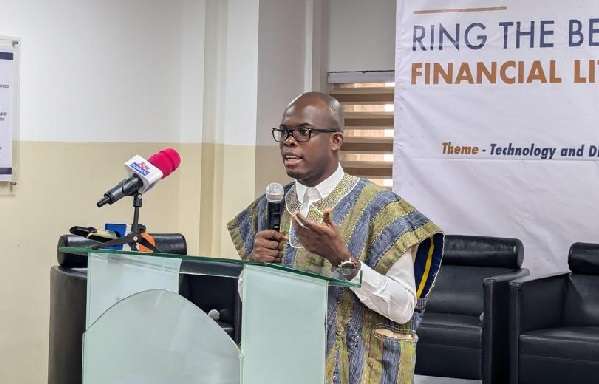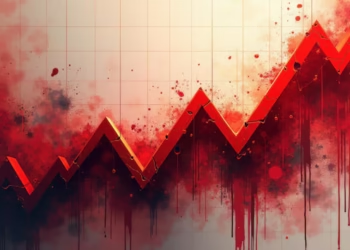Ghana’s capital market has experienced modest growth in recent years, with market capitalisation increasing from GH¢64.51 billion in 2022 to GH¢73.89 billion in 2023, a growth rate of 14.54%.
Despite this positive trend, retail investor participation remains alarmingly low, significantly underperforming when compared to global averages. As of 2023, Ghana’s capital market contributed less than 5% to the country’s Gross Domestic Product (GDP), a figure substantially below the global standard.
Additionally, retail investor participation in the stock market is below 20%, with a majority of Ghanaians viewing the stock market as a domain reserved for the wealthy.
Martin Kwame Awagah, the President of the Ghana FinTech and Payments Association, highlighted this challenge, stating, “Retail investor participation remains below 20%, as many Ghanaians still perceive the stock market as a domain for the wealthy.”
These statistics point to a significant gap in the country’s capital market, with the potential for increased participation, especially among the youth, the unbanked, and small-scale investors, remaining untapped.
The integration of financial technology (FinTech) into Ghana’s capital market presents a viable solution to address these challenges and unlock the market’s full potential.
The Role of FinTech in Financial Inclusion
The advent of FinTech in Ghana has revolutionised the country’s financial ecosystem, enhancing accessibility and promoting financial inclusion for millions.
The Ghana FinTech and Payments Association, led by Martin Kwame Awagah, has been at the forefront of advocating for the deployment of FinTech to modernise financial systems and reduce barriers to entry.
“To curb this problem and make the GSE very attractive to all age groups, businesses, and individuals, we strongly believe that technology and FinTech deployment hold the key to unlocking the full potential of Ghana’s capital markets.”
Martin Kwame Awagah
FinTech solutions such as mobile applications, digital wallets, and other innovative financial tools have the potential to democratise access to the stock market.
By lowering transaction costs, reducing complexities, and making financial products more accessible, FinTech can make the Ghana Stock Exchange (GSE) more appealing to a wider demographic.
For example, mobile trading platforms can allow individuals to trade stocks with just a few taps on their phones. These platforms can be designed to simplify the trading process, making it easy for novice investors to participate without needing extensive financial knowledge. Moreover, digital wallets can streamline the payment process, making it easier for investors to deposit and withdraw funds.
Bridging the Gap with Technology
FinTech’s role in enhancing market accessibility is key to unlocking the potential of Ghana’s capital market. One of the main reasons for the low retail participation rate is the perception that the stock market is complex, intimidating, and exclusive.
Many Ghanaians, particularly those in rural areas or who are unbanked, lack access to traditional financial institutions and view the stock market as beyond their reach.
Through mobile applications and digital platforms, FinTech can break down these barriers and create a more inclusive market.
“Technology and FinTech deployment hold the key to reducing barriers to entry, providing innovative financial products, and enhancing market accessibility for all demographics.”
Martin Kwame Awagah
For instance, these platforms can offer user-friendly interfaces that cater to a broad range of investors, from seasoned professionals to first-time traders. Moreover, FinTech can integrate features such as educational resources and interactive tools that guide users through the stock trading process, helping to demystify the market and encourage participation.
In addition to providing easy access to trading, FinTech can also help reduce the cost of participation. Traditional stock market transactions can involve significant fees, which can deter small-scale investors.
By leveraging blockchain technology and decentralised financial systems, FinTech solutions can reduce transaction costs, making it more affordable for the average Ghanaian to invest.
While technology can create access, financial literacy is a crucial component in ensuring that new investors can fully capitalise on these opportunities.
The Chief Executive Officer (CEO) of the Central Securities Depository (GH) Ltd., Joseph Oko Abumah Lartey, emphasised the need for increased financial literacy alongside the deployment of FinTech solutions.
“Technology is not just a luxury but a vital tool for creating an inclusive financial ecosystem. Without adequate knowledge, investors might struggle to capitalise on the advantages of these new digital tools.”
Joseph Oko Abumah Lartey
Financial literacy programs tailored to the digital age can play a critical role in bridging this gap. By offering online courses, webinars, and interactive tools through FinTech platforms, investors can be educated on the basics of stock market participation, risk management, and long-term financial planning.
These initiatives can empower retail investors with the knowledge they need to make informed decisions, fostering confidence and trust in the capital market.
Another major opportunity FinTech offers is the ability to reach underserved communities. In Ghana, a significant portion of the population remains unbanked, and this lack of access to financial services has been a barrier to capital market participation.
FinTech solutions, particularly mobile money, have already demonstrated success in reaching these underserved populations. Integrating stock market access into existing mobile money platforms could provide a seamless way for these individuals to enter the market without the need for a traditional bank account.
READ ALSO: Dr. Ibn Chambas Urges Ghanaians to Uphold Peaceful Elections























